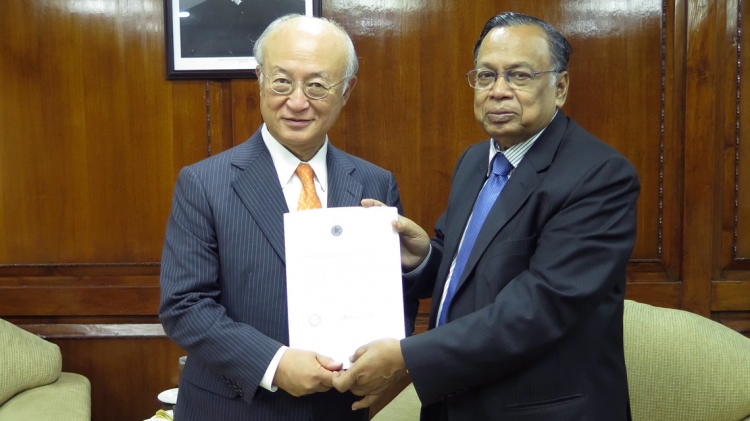Bangladesh is making significant progress in the construction of its first nuclear power plant, IAEA Director General Yukiya Amano said during a visit to the country this week. In his courtesy call on Prime Minister Sheikh Hasina Wazed, Mr Amano appreciated the strong political commitment, the public support, and the cooperation by Russia as important indications of the advances made at power plant. The Prime Minister stressed the need for more electricity for the development of Bangladesh and expressed her vision to expand the country’s nuclear power programme.
Mr Amano underscored the IAEA’s commitment to assist Bangladesh in achieving sustainable development using nuclear science and technology, in particular the safe and secure use of nuclear energy.
He also held talks with Minister for Science and Technology Yeafesh Osman and Foreign Minister Abul Hassan Mahmood Ali.
Minister Osman reiterated Bangladesh’s commitment to fulfil its obligations in nuclear safety, security and non-proliferation, and also discussed additional areas of possible cooperation.
Foreign Minister Mahmood Ali handed Mr Amano a copy of an instrument of acceptance of the Amendment to the Convention on the Physical Protection of Nuclear Material. He discussed the need for rural development and other potential applications of nuclear technology in Bangladesh with Mr Amano.
During this visit, Mr Amano toured the Rooppur Nuclear Power Plant site, located 200 km northwest of Dhaka. It is a 2.4 GWe nuclear power plant that is being contracted with ROSATOM, the Russian State Atomic Energy Corporation, and the first unit is expected to start generating electricity in 2023.
Senior officials briefed Mr Amano on the implementation status of the preparatory activities on the site and the review process for issuing a construction license for the facility. They also explained the role of the country’s regulatory body in ensuring safety and security requirements. Mr Amano stressed the importance of a robust regulatory body and licensing regime.
Bangladesh has received significant IAEA assistance for the review of nuclear laws, preparation for adhering to the international legal instruments, the development and review of regulations and the assessment of sites.
The country decided in 2000 to introduce nuclear power in the energy mix to meet its growing energy demand. To ensure that the relevant process is followed to introduce nuclear power in Bangladesh, the Government requested an IAEA Integrated Nuclear Infrastructure Review (INIR) mission in 2011 and an INIR follow-up mission in 2016. The first review mission provided recommendations and suggestions on improvements necessary in Bangladesh’s first nuclear power plant infrastructure and the second mission assessed the progress achieved, and provided guidance on completion of the remaining gaps as well as the best practices in nuclear power plant infrastructure development.
On 5 July, the University of Dhaka conferred Mr Amano with a degree of Doctor of Laws (Honoris Causa) at a special convocation, presided over by the President of Bangladesh and the Chancellor of the University Abdul Hamid, recognizing Mr Amano’s contribution to promote the safe, secure and peaceful uses of nuclear technologies.




